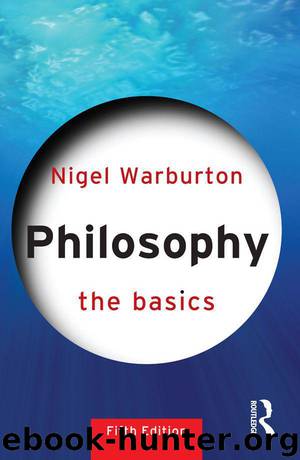Philosophy: The Basics by Warburton Nigel

Author:Warburton, Nigel [Warburton, Nigel]
Language: eng
Format: mobi
ISBN: 9781317813002
Publisher: Taylor and Francis
Published: 2013-08-21T23:00:00+00:00
Positive Freedom
Some philosophers have attacked the idea that negative freedom is the sort of freedom we should strive to increase. They argue that positive freedom is a far more important political goal. Positive freedom is freedom to exercise control over your own life. You are free in the positive sense if you actually exercise control, and not free if you don’t, even if you are not actually constrained in any way. Most defenders of the positive concept of freedom believe that true freedom lies in some kind of self-realization through individuals, or indeed states, making their own life choices.
For instance, if someone is an alcoholic and is driven against their better judgement to spend all their money on wild drinking sprees, then does this amount to exercising freedom? It seems intuitively implausible, particularly if in sober moments the alcoholic regrets these binges. Rather we would tend to think of the alcoholic as controlled by drink: a slave to impulse. Despite the lack of constraint, on the positive account the alcoholic is not genuinely free.
Even an advocate of negative freedom might argue that alcoholics, like children, should be coerced in some ways, on the ground that they are not fully responsible for their actions. But if someone consistently makes foolish life decisions, squanders all their talents, and so on, then according to Mill’s principles we are entitled to reason with them, but never to coerce them into a better way of life. That would be a form of unjustified paternalism, that is, acting as a controlling parent towards someone who has reached an age when they should be free to make their own choices and their own mistakes. For Mill it is not acceptable to intervene in another adult’s life for their ‘own good’ unless they are harming someone else, or are mentally incapable of acting for themselves. Coercion would involve limiting their negative freedom. Those who defend a principle of positive freedom might argue that such a person is not truly free until they realize their potential and overcome their wayward tendencies. It is a short step from this to arguing in favour of coercion as a path to genuine freedom.
Isaiah Berlin maintains that the positive conception of freedom can be used to license all sorts of unjust coercion: agents of the state may justify forcing you to behave in certain ways, on the grounds that they are helping to increase your freedom. Indeed, he points out that historically the positive concept of freedom has frequently been abused in this way. It is not that there is anything intrinsically wrong with the positive conception; rather it is simply that history has shown it to be a dangerous weapon when misused.
Download
This site does not store any files on its server. We only index and link to content provided by other sites. Please contact the content providers to delete copyright contents if any and email us, we'll remove relevant links or contents immediately.
| Books & Reading | Comparative Literature |
| Criticism & Theory | Genres & Styles |
| Movements & Periods | Reference |
| Regional & Cultural | Women Authors |
4 3 2 1: A Novel by Paul Auster(12393)
The handmaid's tale by Margaret Atwood(7764)
Giovanni's Room by James Baldwin(7346)
Asking the Right Questions: A Guide to Critical Thinking by M. Neil Browne & Stuart M. Keeley(5775)
Big Magic: Creative Living Beyond Fear by Elizabeth Gilbert(5772)
Ego Is the Enemy by Ryan Holiday(5450)
The Body: A Guide for Occupants by Bill Bryson(5097)
On Writing A Memoir of the Craft by Stephen King(4944)
Ken Follett - World without end by Ken Follett(4732)
Adulting by Kelly Williams Brown(4574)
Bluets by Maggie Nelson(4556)
Eat That Frog! by Brian Tracy(4540)
Guilty Pleasures by Laurell K Hamilton(4449)
The Poetry of Pablo Neruda by Pablo Neruda(4109)
Alive: The Story of the Andes Survivors by Piers Paul Read(4033)
White Noise - A Novel by Don DeLillo(4010)
Fingerprints of the Gods by Graham Hancock(4004)
The Book of Joy by Dalai Lama(3986)
The Bookshop by Penelope Fitzgerald(3853)
